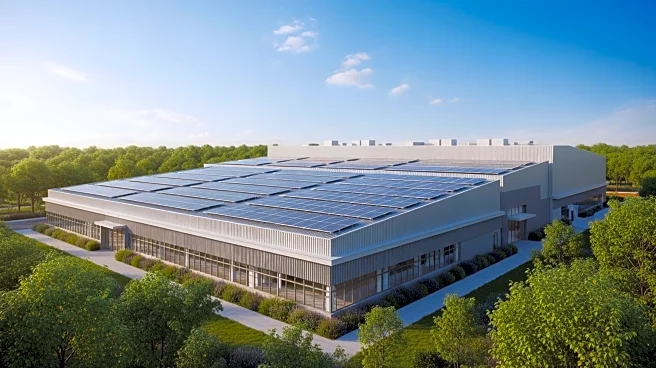What's Happening?
JELD-WEN, a specialist timber door manufacturer, is implementing sustainable practices to achieve zero Scope 1 and 2 emissions at its Penrith site by 2026. The company is transitioning to renewable energy, electrifying equipment, and reducing waste to support
sustainable building design. Initiatives include energy-efficient machinery, electric forklifts, biomass boilers, and certified sustainable timber sourcing. JELD-WEN's efforts reflect a broader industry trend where sustainability in construction is becoming an expectation rather than an aspiration, with manufacturers playing a crucial role in reducing carbon emissions.
Why It's Important?
The shift towards sustainability in manufacturing is critical for achieving net-zero goals in construction. By embedding sustainable practices into their operations, manufacturers like JELD-WEN can significantly reduce their carbon footprint and contribute to a lower environmental impact of buildings. This approach not only supports regulatory compliance but also aligns with the growing demand for sustainable construction solutions. As more projects incorporate sustainability targets, manufacturers that prioritize eco-friendly practices will be better positioned to meet industry expectations and drive meaningful change.
What's Next?
Achieving sustainability in manufacturing requires collaboration across the supply chain. Manufacturers must work closely with contractors and specifiers to ensure that sustainability is integrated into procurement decisions. This involves overcoming cost pressures and regulatory challenges to prioritize eco-friendly practices. As the industry moves towards more ambitious sustainability targets, manufacturers will need to continue innovating and investing in sustainable technologies to maintain their competitive edge and support a better future.
Beyond the Headlines
The conversation around sustainability in construction is evolving, with a focus on how to implement meaningful change rather than questioning its necessity. Manufacturers have a responsibility to lead by example, demonstrating that sustainable processes can be embedded into production without compromising quality. This shift requires a new mindset from all stakeholders, viewing sustainability as standard practice rather than an optional extra. By fostering stronger relationships between contractors and manufacturers committed to sustainability, the industry can ensure that eco-friendly practices are embedded throughout the supply chain.















